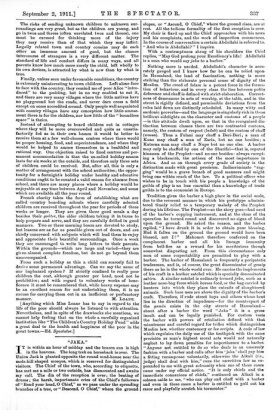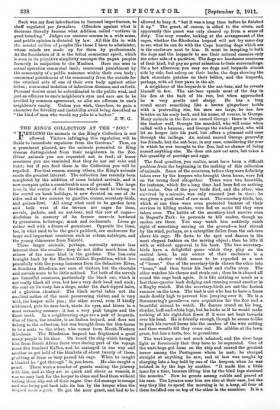" JA KA."
IT is within an hour of midday and the brazen sun is high in the heavens. The long trek on horseback is over. The Union Jack is planted opposite the round mud-house near the mole-hill shaped mosque, which is reserved for distinguished visitors. The Chief of the town, who, according to etiquette, has met me a mile or two outside, has dismounted and awaits my call. The din of the reception is over; the beating of drums ; the harsh, importunate cries of the Chief's followers of " Bend your head, 0 Chief," as we pass under the spreading branches of a tree, or " Descend. 0 Chief," where the ground
slopes, or " Ascend, 0 Chief," where the ground rises, are al rest. All the tedious formality of the first reception is over. My chair is fixed up and the Chief approaches with his news and his complaints, and the work of inspection commences. In the course of conversation a certain Abdullahi is referred to. " And who is Abdullahi? " I inquire.
With a contemptuous shrug of his shoulders the Chief replies, "May God prolong your Excellency's life 1 Abdullahi is a man who would say jaka to a barber."
Nothing more is needed. Abdullahi's character is accu- rately gauged and I know how far he can be relied upon. In Hausaland, the land of fascination, nothing is more striking than the elaborate personal sense of dignity of the Muslim. The creed of Islam is a potent force in the forma- tion of behaviour, and in every class the line between polite deference and chaff is defined with strict elaboration. Correct- ness of demeanour in acts of worship, at the table, and in the street is rigidly defined, and permissible deviations from the rules laid down are distinctly scheduled. In many witty and sardonic proverbs—and the language is singularly rich in these brilliant sidelights on the character and customs of a people —is this attitude dwelt upon, so that in the recognized dis- tinction between classes there are two contrasted customs, namely, the custom of respect (ladab) and the custom of chaff (wassa). Thus a Fulani may chaff a Beri-Beni ; a man of Kano may chaff a man of Zaria, but no one besides ; a Katsena man may chaff a Nupe but no one else. A barber may only be chaffed by one of the Sharifai—that is, reputed kinsmen of the Prophet—and no one besides : always except. ing a blacksmith, the artisan of the most importance in Africa. And so on through every grade of society is the distinction made with great precision. Indiscriminate "rag- ging" would be a grave breach of good manners and might bring one within reach of the law. To a political officer who wishes to be in touch with his people a knowledge of the guilds of play is no less essential than a knowledge of trade guilds is to the economist in Europe.
Tradition gives the barber a high place in the social scale, due to the reverent manner in which his prototype adminis- tered timely relief to a temporary malady of the Prophet during his lifetime. The Prophet—so the story goes—had need of the barber's cupping instrument, and at the close of the operation he turned round and discovered no signs of blood upon the ground. He asked the reason, and the barber replied, "I have drunk it in order to obtain yoar blessing. Had it fallen on the ground the ground would have been blessed, not I! " Mahomet therefore conferred on the complacent barber and all his lineage immunity from hell-fire as a reward for his meritorious though somewhat disgusting act. From this circumstance only men of some respectability are permitted to play with a barber. The barber of Hausaland is frequently a peripatetic tradesman, and is, of course, the great disseminator of gossip there as he is the whole world over. He carries the implements of his craft in a leather satchel which is specially denominated sabiru. A similar satchel is ordinarly termed jaka, such as a leather nose-bag from which horses feed, or the bag carried by hunters into which they place the entrails of slaughtered animals. Such base uses are above the dignity of the barber's craft. Therefore, if rude street boys and others whose bent lies in the direction of impudence—for the counterpart of the gamin exists in the city streets of Hausaland- shout after a barber the word " jab," it is a gross insult and can be legally punished. For custom vests the barber with powers of retaliation defined with that minuteness and careful regard for trifles which distinguishes Muslim law, whether customary or lex scripta. A code of law which regulates the daily use of the toothpick with the same precision as man's highest moral acts would not naturally neglect to lay down penalties for impertinence to a barber. "Anyone not entitled to do so who deals in an unseemly fashion with a barber and calls after him `jaka' shall pay him a fitting recompense voluntarily, otherwise the Alkali (i.e., judge) shall deal with him," runs the unwritten law as ex- pounded to me with great solemnity when one of these cases came under my official notice. "It is only chiefs and the immediate connexions of chiefs," continued an Alkali in a solemn aside to me, "who can play and chaff with a barber and even in these cases a barber is entitled to pull out his razor and playfully scratch his tormentor." Such was my first introduction to licensed impertinence, to chaff regulated per formulam. Offenders against what is decorous literally become what Addison called "outlaws in good breeding." Judges are censores morum in a wide sense, and public opinion is dictated by law. All this fits in with the mental calibre of peoples like those I have to administer, whose minds are made up for them by professionals. At the foundation of it is the tribal communal spirit, which is seen in its primitive simplicity amongst the pagan peoples formerly in subjection to the Muslims. Here one sees in actual operation communal land; communal punishment by the community of a public nuisance within their own body ; communal punishment of the community from the outside for the criminal acts of one of their own body against other tribes ; communal isolation of infectious diseases, and so forth. Personal desires must be subordinated to the public weal, and just as offences to one's neighbour's eyes and ears are to be avoided by common agreement, so also are offences to one's neighbour's vanity. Unless you wish, therefore, to gain a character for frivolity and instability avoid being described as " the kind of man who would say jaka to a barber."
J. W. G.







































 Previous page
Previous page